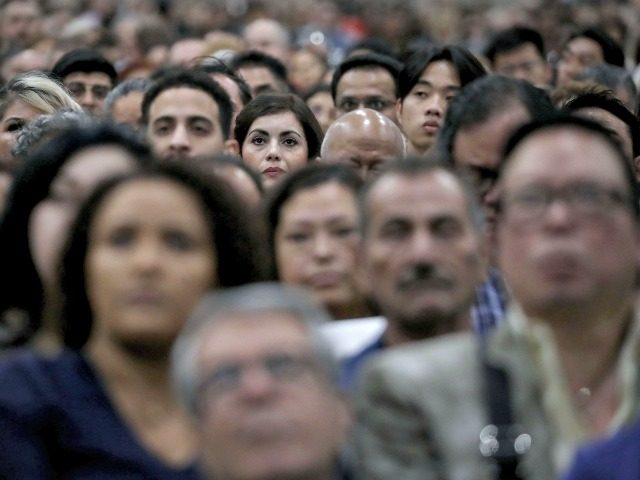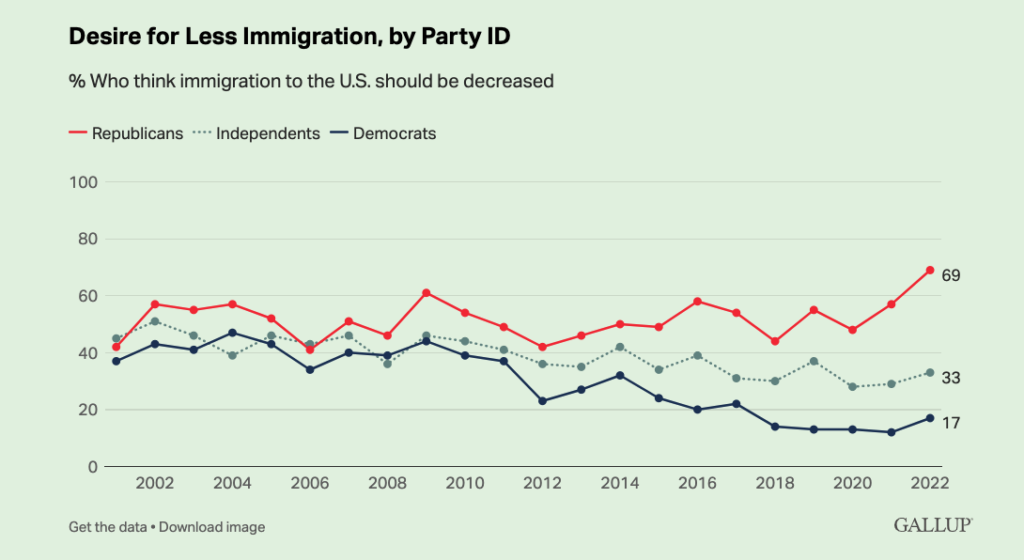Seven-out-of-ten Republicans favor reduced illegal and legal immigration, and GOP voters are evenly split over whether immigration is good or bad for the nation, according to a new Gallup poll.
“Republicans’ Desire for Less Immigration Has Surged Since 2020 … The mounting desire for decreased immigration in recent years has been driven mainly by Republicans, whose preference for reducing immigration is [at 69 percent,] up 21 points since June 2020, when 48% expressed this,” Gallup reported on August 8.
Opposition to migration has nudged up among Democrats and independents, said the survey, which showed “a five-point increase among independents, to 33%, and a four-point increase among Democrats, to 17%.”
The GOP’s growing skepticism about migration reflects the growing polarization since 2o12 when a growing share of “woke” Democrats began to embrace migration. Gallup reported:
In 2008, at the end of the George W. Bush administration, 46% of Republicans and 39% of Democrats wanted immigration decreased — a seven-percentage-point difference. By 2009, that gap had widened to 17 points, and it has since stretched to the current 52 points.
However, the Gallup poll is skewed by its corporate support for migration. For example, Gallup’s press release claims that “the United States has relied on immigration for its economic and cultural vitality,” despite the nation’s huge success during the low-immigration decades from 1924 to 1970.
Other surveys show greater levels of opposition, especially when polls provide a proxy issue that allows respondents to avoid the social pressure to endorse the establishment’s claim that the United States is a “Nation of Immigrants.”
For example, an April 2021 survey asked 2,200 Americans about the coronavirus and migration: “Based on what you know, do you think immigrants help or hurt the United States’ long-term economic recovery to COVID-19?”
The GOP split 8 percent for “help,” and 68 percent for “hurt.” That’s an 8:1 opposition to migration.
Democrats split only 38 percent “help” and 20 percent “hurt.”
The election-deciding group of swing-voting independents split 3:1 against migration — just 16 percent “help” and a near-majority of 42 percent “hurt.”
Hispanics split 28 percent “help” and 30 percent “hurt,” contradicting claims by the GOP establishment that pro-migration policies will spur GOP support among Hispanics.
Blacks split 33 percent for “help,” and 21 percent for “hurt.”
The April 2021 survey was conducted by Morning Consult for the establishment-run advocacy group, the Bipartisan Policy Center.
Many polls show the public wants to welcome some immigration — but they also show deep and broad public opposition to labor migration and the inflow of temporary contract workers into jobs sought by young U.S. graduates.
This “Third Rail” opposition is growing, anti-establishment, multiracial, cross-sex, non-racist, class-based, bipartisan, rational, persistent, and recognizes the solidarity that American citizens owe to one another.
But many media outlets and pollsters demote migration as a “culture war” issue — even though it is also a huge pocketbook issue for most Americans.
Each year, roughly 4 million young Americans begin work and careers. But President Joe Biden and his progressive deputies have welcomed the inflow of roughly 2 million people across the southern border, alongside the annual inflow of roughly 1 million legal immigrants and a similar of visa workers.
Overall, that adds up to at least one new migrant for every two Americans, each of whom will compete for the jobs, homes, and careers needed by Americans. In practice, this means the federal government is tilting the economy, wages, and government priorities away from ordinary Americans, and towards coastal investors, political donors, Fortune 500 companies, and foreign migrants.
In Nebraska, for example, business groups are calling for more migrants because President Donald Trump’s migration cutbacks have reduced the supply of workers and forced employers to pay higher wages.
Nebraska.TV reported on August 7:
It’s easy to see a “Help Wanted“ sign in any Nebraska town or city, and that’s why some organizations are working together to build a state-wide coalition and to change the narrative so people understand immigrants could be central to addressing the labor shortage problems in the state.
…
[Nebraska Hispanic Chamber President Yesenia] Peck said at the end of the day, short staffing affects everyone. With the labor shortage, companies have to pay more for workers available.
“This is not good,” Peck said.
Business groups justify their demands for cheaper labor as a fix for rising inflation rates — but survey data shows that rising wages contribute little to the rising cost of retail goods.
Rising wages are also good for politicians, according to the former head of the U.S. Chamber of Commerce.
Extraction Migration
Since at least 1990, the D.C. establishment has extracted tens of millions of legal and illegal migrants —plus temporary visa workers — from poor countries to serve as workers, managers, consumers, and renters for various U.S. investors and CEOs.
This half-hidden federal economic policy of Extraction Migration has tilted the free market toward investors and employers.
This labor inflation makes it difficult for ordinary Americans to get married, advance in their careers, raise families, or buy homes.
Extraction migration has also slowed innovation and shrunk Americans’ productivity, partly because it allows employers to boost stock prices by using cheap stoop labor instead of productivity-boosting technology.
Migration undermines employees’ workplace rights, and it widens the regional wealth gaps between the Democrats’ big coastal states and the Republicans’ heartland and southern states. The flood of cheap labor tilts the economy towards low-productivity jobs and has shoved at least ten million American men out of the labor force.
An economy built on extraction migration also drains Americans’ political clout over elites, alienates young people, and radicalizes Americans’ democratic civic culture because it allows wealthy elites to ignore despairing Americans at the bottom of society.
The economic policy is backed by progressives who wish to transform the U.S. from a society governed by European-origin civic culture into a progressive-directed empire of competitive, resentful identity groups. “We’re trying to become the first multiracial, multi-ethnic superpower in the world,” Rep. Rohit Khanna (D-CA) told the New York Times in March 2022. “It will be an extraordinary achievement … we will ultimately triumph,” he boasted.
Business-backed migration advocates hide this Extraction Migration economic policy behind a wide variety of noble-sounding explanations and theatrical border security programs. For example, progressives claim that the U.S. is a “Nation of Immigrants,” that migration is good for migrants, and that the state must renew itself by replacing populations.



COMMENTS
Please let us know if you're having issues with commenting.